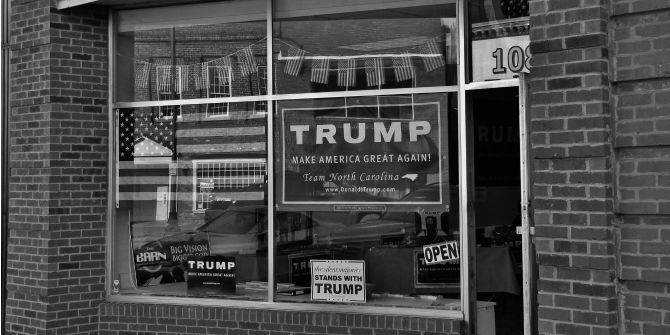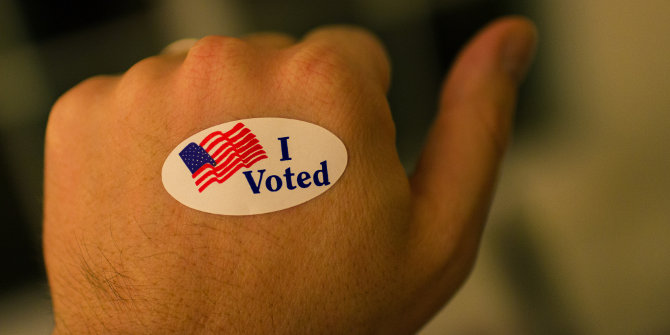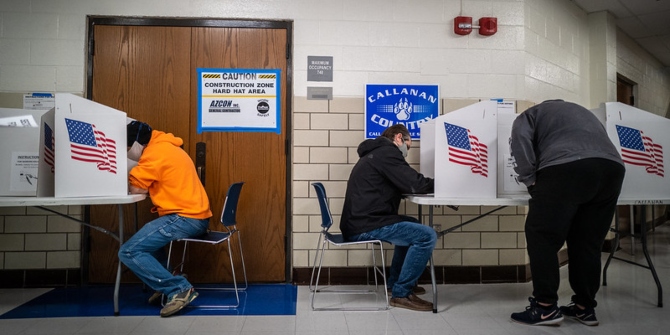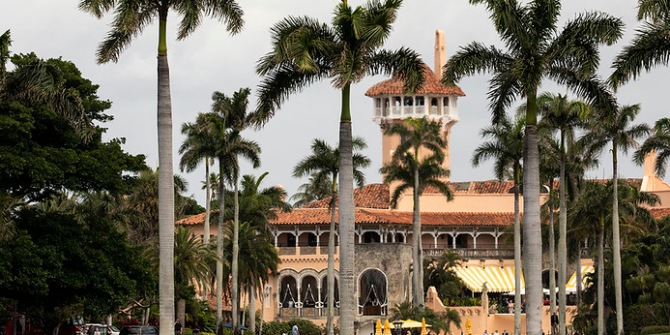
 US presidential campaigns may be long and drawn out, but according to research by Rebecca Lessem and Carly Urban, they can bring considerable economic benefitsis to the states hosting primary elections.
US presidential campaigns may be long and drawn out, but according to research by Rebecca Lessem and Carly Urban, they can bring considerable economic benefitsis to the states hosting primary elections.
Next week sees the end of the topsy-turvy spring presidential primary season, which has seen New York billionaire become the Republican Party’s improbable nominee, with Hillary Clinton very likely to take the nomination for the Democrats. But do these nomination contests have any effects on the states themselves after the candidates have left town?
Our new study, forthcoming in the Economic Journal, finds that the increased spending in a state around a primary increases total per capita earnings in that quarter by 25 percent – and by more in accommodation and the retail sector. What’s more, a multiplier effect means that one more dollar in campaign spending results in between 1.2 and 1.4 more dollars in the state economy.
Our results suggest that when people in a state are greeted with a political campaign, they should relish the local stimulus that this provides – and the campaign contributions transferred from people in other states who allow this to occur. Similarly, policy-makers, who continually discuss the re-ordering of state primaries, should consider the local economic growth benefits when making these decisions.
These findings are particularly important for the 2016 primary election campaign, where the nominating process is likely to reach every state. The six states scheduled for 7 June, the final primary date, should anticipate economic gains from the upcoming primary spending.
It’s worth noting that Americans often complain that political campaigns dominate the news and congest their local areas. States with early elections in the presidential primaries are typically perceived as having a disproportionate influence on the outcome of the election. But what if there is a silver lining in hosting the spectacle of a campaign? Can campaigns actually provide spillover benefits to people in the state?
Our study examines a potential gain from hosting a primary election, which comes through economic benefits from campaign spending. In 2008 alone, US presidential campaigns spent $348 million across states on hotels, meals, rental cars and other campaign expenditures. This figure does not include the amount spent by media covering the race, personal in-state expenses of staffers or additional funds that people spend when coming to witness the spectacle of a campaign.
Credit: Gerry Dincher (Flickr, CC-BY-SA-2.0)
We studied the effect of primary election spending by comparing state-level earnings in years when states did and did not receive primary election spending. This varies across years due to the nature of primary elections. Candidates typically campaign in early primary states first, and wait to allocate resources in each state until their primary date is near.
Furthermore, across election cycles, primary elections vary in duration. For example, in 2008, the Democratic primary season extended into June, while in 2012, all primary elections were completed by early May. This means that many states received campaign spending in 2008 but not in 2012. In addition, states often change their primary date: if a state moves up in the election season (closer to January), the campaign is more likely to reach the given state, and if it moves back (closer to July), it is less likely to see any campaign activity.
We compared total earnings in years in which states were reached by campaigns to those in which the same states were not reached, as well as across states reached and not reached in primary campaigns between 1974 and 2008. While it is unclear whether campaign spending will affect overall income, sectors like accommodations, services and retail are more likely to be affected by primaries.
We find that hosting a primary increases total per capita earnings in that quarter by 25 percent. This effect is slightly larger in the service sector, where a primary campaign increases a state’s per capita quarterly income by 26.5 percent. The largest effect is in the retail sector, which sees a 27 percent increase in income.
For the 2004 and 2008 election cycles, we find that a 10 percent increase in campaign spending results in a 0.9 percent increase in per capita income. This effect is slightly larger in accommodation (1.1 percent) and the retail sector (1.6 percent). This results in a multiplier effect, where people earning more money in these sectors circulate the money back into the economy. One more dollar in campaign spending results in 1.2-1.4 more dollars in the state economy.
This article is based on the forthcoming paper ‘Local Economic Gains from Primary Election Spending’ forthcoming in the Economic Journal.
Please read our comments policy before commenting.
Note: This article gives the views of the author, and not the position of USAPP – American Politics and Policy, nor the London School of Economics.
Shortened URL for this post: http://bit.ly/1P1TSyA
_________________________________
 Rebecca Lessem – Carnegie Mellon University
Rebecca Lessem – Carnegie Mellon University
Rebecca Lessem is an Assistant Professor of Economics at the Tepper School of Business.at Carnegie Mellon University. Her research interests include labor economics and applied microeconomics.
 Carly Urban – Montana State University
Carly Urban – Montana State University
Carly Urban is an Assistant Professor of Economics in the Department of Agricultural Economics and Economics at Montana State University. She holds a Ph.D. in Economics from the University of Wisconsin-Madison and a B.A. in Economics and International Affairs from the George Washington University. Her research focuses on economics of the political market and the policy analysis of financial interventions, and has been published in top economics journals including the Economic Journal, the Journal of Human Resources, and the Journal of Economics, Behavior, and Organization.







